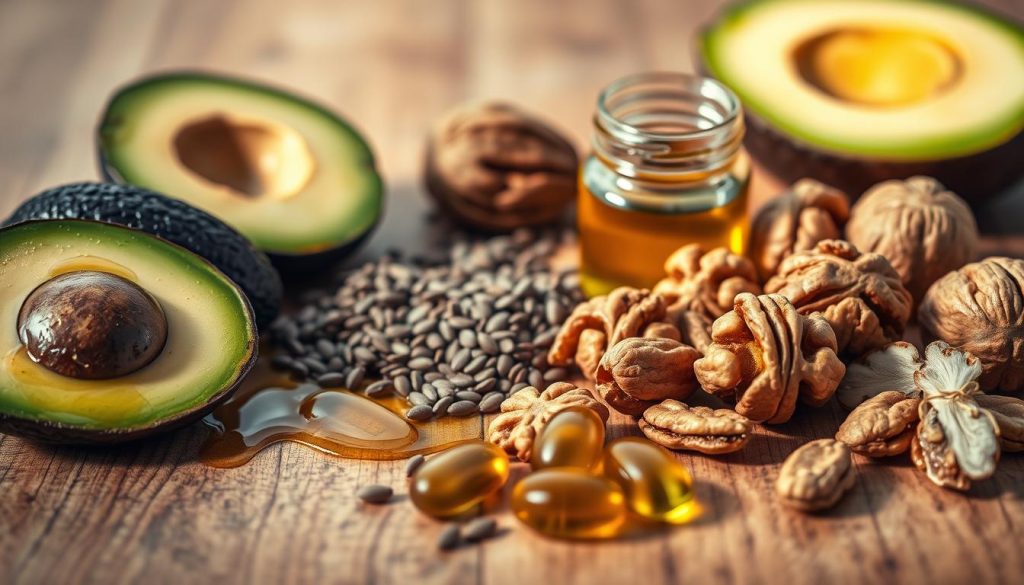I remember feeling frustrated with hormonal imbalances. I was eating well and exercising. But I didn’t know about the importance of optimal fat consumption for hormone balance, mainly how fat intake and fitness play a crucial role in stabilizing hormones.
Learning about dietary fats, exercise, and hormones changed everything. I saw that a targeted approach is key for balance. This article will show how fat intake and fitness help with hormone balance. For more, check out our complete guide to fat intake and fitness strategies that support hormonal health.
The Critical Connection Between Dietary Fat and Hormones

It’s essential to know how dietary fat and hormones are connected. Dietary fats are not just for energy. They help make and control hormones vital for maintaining overall health and well-being.
How Fats Influence Hormone Production
Fats are key to making hormones. Cholesterol, a fat, is used to make hormones like estrogen and testosterone, which are crucial for numerous bodily functions, including growth, metabolism, and mood regulation. The fats we eat can change how hormones are made, impacting our mood, energy levels, and reproductive health. For instance, when we consume healthy fats, such as those found in avocados and nuts, we support the production of beneficial hormones that can enhance our overall well-being.
Conversely, an imbalance caused by unhealthy fats can lead to hormonal disruptions that affect physical health and emotional stability.
Omega-3 fats in fish oil help make anti-inflammatory hormones, which are crucial in reducing inflammation throughout the body and promoting heart health. These essential fatty acids are high concentrations in fatty fish like salmon and mackerel, and plant sources such as flaxseeds and walnuts.
Saturated fats can change how cholesterol is made, affecting hormone production, as they influence the levels of LDL and HDL cholesterol in the body. While some saturated fats can be beneficial in moderation, excessive intake may lead to imbalances that disrupt normal hormone function.
The Consequences of Insufficient Fat Intake
Not eating enough fat can upset hormone levels. A low-fat diet can mess with sex hormones. This can cause problems like irregular periods or a low sex drive.
Furthermore, insufficient fat intake may lead to deficiencies in essential fatty acids, vital for producing hormones that regulate various bodily functions, including mood, metabolism, and reproductive health. Without adequate fats, the body struggles to maintain hormonal balance, potentially leading to mood swings, fatigue, and even metabolic disorders.
Additionally, a lack of healthy fats can hinder the production of steroid hormones, which are crucial for stress response and overall well-being. When deprived of these necessary fats, the body may resort to imbalances that further exacerbate hormonal disruptions, leading to long-term health challenges.
Also, insufficient fat makes it hard to absorb vitamins A, D, E, and K. These vitamins help control hormones.
| Type of Fat | Hormonal Effect | Food Sources |
|---|---|---|
| Saturated Fats | Influences cholesterol and steroid hormone production | Butter, Coconut Oil, Red Meat |
| Omega-3 Fatty Acids | Supports anti-inflammatory hormone production | Fatty Fish, Flaxseeds, Walnuts |
| Monounsaturated Fats | Improves insulin sensitivity and hormone balance | Olive Oil, Avocados, Nuts |
Understanding Different Types of Dietary Fats

Dietary fats are not all the same. Knowing their differences helps support hormone balance. The fat we eat affects our energy and reproductive health and is crucial in producing and regulating hormones essential for overall well-being.
Saturated Fats and Their Hormonal Effects
Saturated fats are present in animal products and some plant oils, such as coconut oil. They help make cholesterol, which is needed for hormones. Cholesterol is a building block for several hormones, including sex hormones like estrogen and testosterone, which are vital for reproductive health and overall hormonal balance.
These hormones play critical roles in reproduction and regulating mood, energy, and metabolism. Eating healthy saturated fats helps keep hormones balanced. It is essential to choose minimally processed sources to maximize their health benefits, such as grass-fed butter and organic coconut oil, which provide additional nutrients and support optimal hormone function.
| Type of Saturated Fat | Food Sources | Health Benefits |
|---|---|---|
| Short-Chain Fatty Acids | Butter, Ghee | Supports gut health and reduces inflammation |
| Medium-Chain Fatty Acids | Coconut Oil, Palm Kernel Oil | Quick energy source, may aid weight loss |
| Long-Chain Fatty Acids | Red Meat, Dairy Products | Supports hormone production and cellular health |
Moreover, these sources of saturated fats often contain beneficial fatty acids and fat-soluble vitamins that further enhance hormonal health and overall well-being, making them an essential part of a balanced diet.
Monounsaturated Fats for Hormone Support
Monounsaturated fats are in avocados, olive oil, and nuts. These healthy fats are suitable for the heart and play a significant role in hormone production and regulation.
| Food Sources | Health Benefits | Additional Notes |
|---|---|---|
| Avocados | Rich in potassium and fiber, supports heart health | Versatile in recipes, can be used in salads or spreads |
| Olive Oil | Contains antioxidants and reduces inflammation | Best used in dressings or for drizzling over dishes |
| Nuts (e.g., almonds, walnuts) | Supports brain health and weight management | Great as snacks or added to meals for crunch |
By including sources rich in monounsaturated fats in your diet, such as almonds, peanuts, and canola oil, you can help to maintain stable hormone levels, which is crucial for overall health. Additionally, these fats benefit our bodies by absorbing fat-soluble vitamins such as A, D, E, and K, which are essential for various bodily functions.
They also contribute to cellular health by promoting the integrity of cell membranes, thereby supporting various metabolic processes. Furthermore, incorporating monounsaturated fats into your meals can improve cholesterol levels, reduce the risk of heart disease, and enhance insulin sensitivity, making them an essential component of a balanced diet.
Essential Polyunsaturated Fats (Omega-3 and Omega-6)
Polyunsaturated fats, like omega-3 and omega-6, are key for hormones and play a significant role in maintaining our overall health. Omega-3s, found in fatty fish such as salmon and sardines, as well as in plant sources like flaxseeds and walnuts, are known for their anti-inflammatory properties, which can help reduce inflammation throughout the body and support brain health by promoting cognitive function and mood stability.
Omega-6s, commonly found in vegetable oils such as sunflower and corn oil, are also essential for skin health and hair vitality, contributing to maintaining cell membranes and overall cellular function. The right balance of these fats is essential to ensure optimal hormonal function and overall well-being, as an imbalance can lead to various health issues.
| Type of Fat | Sources | Health Benefits |
|---|---|---|
| Omega-3 | Fatty fish (salmon, sardines), flaxseeds, walnuts | Anti-inflammatory, supports brain health, improves mood stability |
| Omega-6 | Vegetable oils (sunflower, corn), nuts, seeds | Essential for skin health, supports cellular function |
Exploring different fats shows we need a balanced diet for hormone health, including polyunsaturated, monounsaturated, and saturated fats in moderation. Eating healthy fats supports our hormones and overall health, as these fats are crucial for absorbing fat-soluble vitamins and producing hormones.
Incorporating sources like avocados, nuts, and olive oil into our meals can enhance our dietary intake of beneficial fats, ultimately promoting better hormonal balance and improving our quality of life.
Assessing Your Current Hormonal Health

You need to check your current health to get your hormones in balance. Knowing your hormone levels helps you find any problems. This info is key for choosing the proper diet and exercise. Additionally, urine tests can provide valuable insights into hormone levels over time, helping to identify any imbalances further.
Common Signs of Hormonal Imbalance
Spotting signs of hormonal imbalance is the first step to fixing it. Look out for:
- Unexplained weight gain or loss
- Fatigue or low energy levels
- Mood swings or irritability
- Sleep disturbances
- Changes in appetite or metabolism
These signs can hurt your life and health. For instance, unexplained weight fluctuations can indicate metabolism or hormonal regulation issues, leading to further complications if not addressed. Such fluctuations may stem from conditions like thyroid disorders or insulin resistance, significantly affecting overall well-being.
Fatigue can severely impact daily functioning, making it difficult to maintain productivity or enjoy activities. Chronic fatigue affects physical energy and can lead to cognitive issues, such as trouble concentrating or memory lapses.
Mood swings and irritability often affect personal relationships and overall mental health, creating a cycle of emotional distress that can be challenging to break. Furthermore, sleep disturbances can contribute to a cycle of fatigue and stress, decreasing physical and mental health.
Additionally, changes in appetite or metabolism can lead to unhealthy eating patterns, exacerbating hormonal issues and potentially leading to weight gain or loss. If you see many of these, you might have a hormone problem, and it’s essential to consult a healthcare professional for a thorough evaluation and tailored advice.
Testing Options for Hormone Evaluation
There are many ways to check your hormone levels. You can try: blood tests, saliva tests, or urine tests, each offering unique insights into your hormonal health.
| Test Type | Description | Usefulness |
|---|---|---|
| Blood Tests | Measure hormone levels in the blood | Highly accurate for many hormones |
| Saliva Tests | Measure hormone levels in saliva | Helpful in assessing cortisol and other hormones |
| Urine Tests | Measure hormone metabolites in urine | Provides insight into hormone production over time |
Fat Intake and Fitness for Hormone Balance: The Fundamental Approach
To keep hormones balanced, eating the right fats and exercising are key. A mix of good fats and exercise can help your hormones, as different types of physical activity can target specific hormonal responses.
Calculating Your Fat Requirements
How much fat you need depends on age, sex, weight, and activity. Adults should eat 20-35% of their calories as fat. For example, if you eat 2,000 calories daily, you should have 44-77 grams of fat.
| Activity Level | Recommended Fat Intake (% of daily calories) | Example (2,000 calories/day) |
|---|---|---|
| Sedentary | 20-25% | 44-55 grams |
| Moderately Active | 25-30% | 55-67 grams |
| Very Active | 30-35% | 67-77 grams |
If you want advice, please talk to a doctor or a dietitian. They can give you tips that are just right for you, helping you create meals that support your hormonal balance effectively.
These professionals can evaluate your unique health profile, considering your medical history, lifestyle, and specific hormonal needs. By doing so, they can provide tailored guidance on the types of fats and nutrients that will best support your hormonal health.
Additionally, they can help you navigate any dietary restrictions or preferences, ensuring that your meal plan is effective but also enjoyable and sustainable in the long run.
Matching Exercise Types to Your Hormonal Goals
There are exercises for different hormone goals. Strength training boosts testosterone, while cardio helps with insulin. Strength training, in particular, increases muscle mass and enhances metabolic rate, benefiting overall hormonal balance.
On the other hand, cardiovascular exercises improve blood circulation and help regulate insulin levels, which are crucial for maintaining energy and preventing insulin resistance. Mixing these exercises is best for hormone balance.
By incorporating a variety of workouts into your routine, such as high-intensity interval training (HIIT) alongside strength training and steady-state cardio, you can enhance your overall hormonal health and improve your fitness results.
This diverse approach keeps your workouts interesting and ensures that you address multiple aspects of hormonal function, leading to better long-term health outcomes.
Want to improve your workout? For more tips, visit Fit Tips Daily. They have great advice on diet and exercise for better hormones.
Creating Your Hormone-Balancing Meal Plan

To balance hormones with food, plan your meals carefully. Focus on fats that help hormones. A good meal plan ensures you get the right fats for your hormones while incorporating various nutrient-dense foods that support overall hormonal health.
First, learn how to make meals better for hormones. We’ll look at breakfast, lunch, dinner, and snacks.
Breakfast Options Rich in Hormone-Supporting Fats
Start your day with healthy fats for hormones. Try these:
- Avocado toast with eggs – This combination provides healthy monounsaturated fats from the avocado and offers high-quality protein from the eggs, both essential for hormone production and regulation.
- Greek yogurt with nuts and seeds (like almonds and chia seeds) is rich in probiotics that support gut health. In contrast, nuts and seeds add a variety of healthy fats and essential nutrients like magnesium and zinc, which are crucial for hormonal balance.
- Smoothies with coconut milk and flaxseeds – Coconut milk contains medium-chain triglycerides that can boost metabolism, and flaxseeds are a great source of omega-3 fatty acids, which help reduce inflammation and support hormonal health.
These foods give energy and help hormones, promoting a healthier hormonal balance throughout the day. Incorporating such nutrient-dense options into your breakfast routine can set a positive tone for your metabolism and energy levels, ensuring you feel satiated and balanced as you go about your day.
Lunch and Dinner Strategies
For lunch and dinner, mix protein, healthy fats, and carbs. Try these:
- Grilled salmon with olive oil-based salad dressing, which not only adds a delicious flavor but also provides heart-healthy monounsaturated fats and antioxidants that can help reduce inflammation and promote overall health.
- Meat cooked in coconut oil or ghee is an excellent source of healthy fats that can support metabolic function and enhance nutrient absorption, making your meals more nourishing.
- Vegetable stir-fries with nuts and seeds. These dishes can be easily customized with seasonal vegetables and spices for added flavor and nutrients. Incorporating a variety of colorful vegetables makes the dish visually appealing and ensures a broad spectrum of vitamins and minerals. At the same time, adding nuts and seeds provides a satisfying crunch and a boost of protein and healthy fats.
Healthy Fat-Rich Snacks and Supplements
Snacks and supplements with healthy fats also help hormones. Try these:
- Handfuls of nuts and seeds, such as almonds, walnuts, and chia seeds, rich in omega-3 fatty acids, protein, and fiber, play a crucial role in hormone production and regulation.
- Dark chocolate with 70% cocoa is not only a delicious treat but also packed with antioxidants and magnesium, which can help reduce stress and improve mood, positively influencing hormonal balance.
- Omega-3 supplements from good sources, like fish oil or algae oil, provide essential fatty acids known to support heart health and reduce inflammation, which can be beneficial for maintaining stable hormone levels.
These snacks and supplements fill nutritional gaps and support hormones. Incorporating these nutrient-dense options into your diet ensures that your body receives the necessary components to maintain hormonal health and overall vitality.
You can improve overall well-being and energy levels by planning meals with hormone-supporting fats. This proactive approach enhances your physical health and contributes to mental clarity and emotional stability, making it easier to navigate daily challenges.
Exercise Protocols That Enhance Hormonal Balance
Good exercise is key for hormone balance, controlling hormone levels and improving mood and energy. Regular activities like strength training and cardio enhance hormonal profiles and release endorphins, crucial for boosting outlook and stamina. Strength training not only builds muscle but also promotes the production of hormones that are essential for overall health. On the other hand, when done in moderation, cardiovascular exercises can effectively support heart health and enhance endurance.
Finding an enjoyable routine, whether dancing, cycling, or yoga, helps maintain consistency, reinforcing exercise benefits for hormonal health. By making physical activity a fun and integral part of your lifestyle, you can create a sustainable approach to wellness that nurtures both your body and mind.
Strength Training for Hormone Optimization
Strength training helps balance hormones. It boosts growth hormone and testosterone for muscle growth. Engaging in 2-3 weekly strength workouts, like squats and bench presses, is essential for building muscle and enhancing your metabolic rate.
Incorporating compound movements, such as deadlifts and overhead presses, can further optimize your hormonal response by activating multiple muscle groups simultaneously. To get balanced fat intake for optimal hormones, you need a structured plan incorporating regular strength training, ensuring you progressively challenge your muscles to stimulate hormonal responses effectively.
This progressive overload is crucial for continued improvement and adaptation. Additionally, while focusing on strength training, it’s essential to include healthy fats and nutrient-dense foods, such as avocados, nuts, and seeds, to support overall hormonal function. These nutrients play a vital role in hormone production and regulation, contributing to a well-rounded approach to fitness and health.
Cardiovascular Exercise: Finding the Sweet Spot
Cardio is also essential for hormone balance. But too much can mess with hormones. Engaging in moderate cardiovascular exercise, such as brisk walking, cycling, or swimming, can help maintain a healthy hormonal environment by improving circulation and promoting overall cardiovascular health.
These activities elevate your heart rate and increase blood flow, essential for delivering nutrients and oxygen to your muscles and organs. Aim to do 15-20 minutes of cardio, 2-3 times a week, for best results, while ensuring you listen to your body and adjust intensity as needed.
Finding a balance is essential, as excessive cardio can increase cortisol levels, negatively impacting hormone production and overall well-being. Therefore, it’s advisable to incorporate a variety of cardio workouts to keep things interesting and prevent burnout, such as interval training or group classes, which can also provide social support and motivation.
Recovery Practices That Support Hormonal Health
Rest is as important as exercise for hormones. Sleep 7-9 hours a night to allow your body to recover and regenerate. Quality sleep is crucial in hormone regulation, impacting everything from appetite to stress.
Also, try yoga or meditation to lower cortisol, a stress hormone that can disrupt hormonal balance when elevated. Engaging in yoga can enhance flexibility and promote relaxation, while meditation can help clear your mind and reduce anxiety, further supporting your hormonal health.
Combine strength, cardio, and rest for a balanced fitness plan that caters to your overall well-being. Be consistent and patient, as achieving hormonal balance is a gradual process. It takes time to see results, and regularly assess your progress to ensure you’re on the right track.
Remember, incorporating rest days into your routine is as vital as your workout days, allowing your muscles to repair and grow stronger. Additionally, listening to your body’s signals can guide you in adjusting your fitness regimen for optimal health.
Implementing Your Fat and Fitness Protocol

The journey to hormonal balance starts with a plan for fat intake and fitness. To get balanced fat intake for optimal hormones, you need a structured plan that includes regular monitoring and adjustments based on your progress.
Week 1 – 2: Establishing Your Baseline
First, track your fat intake and fitness. Use a food diary or app to monitor your fat and activity. This will show you your current habits and where you can improve, setting the foundation for effective adjustments in your diet and exercise routine to achieve hormonal balance.
You can identify patterns and make informed dietary choices by consistently recording your food intake. Additionally, consider the fats you consume, such as saturated, unsaturated, and trans fats, and the timing of your meals and workouts.
Understanding the differences between these fats is crucial, as unsaturated fats, for example, support heart health and hormone production. In contrast, trans fats can disrupt hormonal balance and lead to adverse health outcomes.
This comprehensive tracking will provide deeper insights into how your dietary choices and physical activities influence your hormone levels, energy, and overall well-being. Moreover, by reflecting on your activity levels and how they correlate with your dietary intake, you can create a more tailored approach to your fitness regimen, ensuring that you are consuming the right fats and engaging in the most effective exercises for your body.
Weeks 3 – 4: Introducing Strategic Changes
After tracking, make changes to your diet and fitness. Adjust your fat intake and add exercises that help hormones. This adjustment process is crucial because it allows you to fine-tune your nutritional choices, ensuring that the types of fats you consume are conducive to maintaining hormonal balance.
Furthermore, targeted exercises can significantly enhance your hormonal health, supporting your body’s efforts to regulate weight and energy levels. This supports fat intake for hormonal balance and weight management, ultimately enhancing overall health and vitality.
Weeks 5 – 8: Fine-Tuning Your Approach
Keep improving your fat and fitness plan as you go. It’s essential to watch your hormone levels, energy, and health and understand how these factors interconnect. Regularly monitoring your hormone levels can provide insights into how well your body responds to dietary changes and exercise routines.
Please make any changes if needed, whether adjusting your fat intake or varying your workouts to include different exercises supporting hormonal balance. Also, please look at your progress to ensure you are on the right track.
This ongoing evaluation will help you identify what works best for your body and make necessary adjustments to optimize your health journey.
| Week | Fat Intake | Fitness Routine |
|---|---|---|
| 1-2 | Track current intake | Monitor the current routine |
| 3-4 | Adjust to recommended levels | Introduce hormone-supporting exercises |
| 5-8 | Fine-tune based on response | Adjust routine as needed |
Tracking Progress and Making Adjustments

To get your hormones in balance, it’s key to watch your progress and tweak as needed. You should monitor essential signs and change your diet and exercise plan if needed, especially if you notice any fluctuations in your energy levels or mood.
Biomarkers to Monitor
Here are the biomarkers to watch:
- Blood glucose levels show how your body reacts to diet changes. Monitoring these levels can help you understand how well your body processes carbohydrates and whether adjustments are needed to improve energy levels and metabolic health.
- Hormone panels: Regular tests can show if your hormone levels are getting better. These panels can provide insights into your hormonal health, indicating whether your dietary changes positively influence hormone production and balance.
- Lipid profiles: These tests show how diet affects your health. They can reveal important information about your cholesterol levels and the types of fats in your diet, helping you make informed choices about what to include or limit in your meals.
For more on how nutrition helps athletes, check out Triathlete.com. It has excellent tips for better nutrition, including meal planning and timing strategies that can enhance performance and recovery.
Overconsumption of unhealthy fats can lead to hormonal imbalances and hinder your progress. It’s crucial to focus on incorporating healthy fats, such as those from avocados, nuts, and fish, to support optimal hormone function and overall health.
When and How to Modify Your Approach
If your progress isn’t what you hoped, it’s time to change your plan. Here’s how:
- Reassess your fat intake: Ensure you eat the right fats for your hormones.
- Adjust your exercise routine: Change your workout to help your hormone balance.
- Consult a professional: Ask a doctor or dietitian for help if unsure.
Also, keep a food diary to track your meals and identify patterns affecting your hormone levels.
By watching your biomarkers and being ready to adjust, you can find the best way to balance your hormones through diet and exercise.
Common Mistakes to Avoid in Hormone-Balancing Nutrition

Dietary fat is key for hormone balance. Knowing common mistakes can help a lot. Understanding how fats affect your body is essential, as this knowledge allows for better management of hormone levels and overall health.
Overconsumption of Inflammatory Fats
Too much of certain fats can upset hormone balance. Fats like omega-6 and trans fats cause inflammation, which can disrupt the delicate processes that regulate hormone production and function in the body. This harms hormone production, leading to various health issues, including mood swings, weight gain, and metabolic disorders. To fix this, balance omega-6 with omega-3 fats, which are known for their anti-inflammatory properties and ability to support hormone health.
Learn more about fats at this link. It talks about losing belly fat, which ties into hormone balance and emphasizes the importance of choosing the right types of fats in your diet for overall wellness.
Decreases the production of essential hormones, leading to further imbalances. When hormone levels are disrupted, it can create a cycle of health problems that may be difficult to reverse without making significant dietary changes.
Undereating and Its Hormonal Consequences
Eating too little harms hormone balance. Not enough energy lowers hormone production, critical for maintaining various bodily functions. This includes essential hormones like leptin, which regulates energy balance and appetite, and insulin, which plays a key role in glucose metabolism.
Insufficient intake of calories can disrupt the normal signaling of these hormones, leading to increased hunger and potential weight gain. Please ensure you eat enough to keep your hormones in check, as failing can create a cascade of adverse effects. This can lead to weight gain, fatigue, and other metabolic issues if not addressed promptly.
Additionally, chronic undereating can result in long-term health consequences, such as diminished muscle mass and weakened immune function, further complicating your overall health and wellness.
Ignoring Individual Responses to Fat Types
Everyone reacts differently to fats. Some do well with more saturated fats, while others need less to feel their best. Pay attention to how your body reacts to different types of fats is crucial, as this awareness can guide you in making healthier dietary choices tailored to your unique needs.
For instance, while some individuals may thrive on a diet rich in particular saturated fats, others may find that these fats lead to discomfort or adverse health effects. Understanding your body’s signals can help you determine which fats benefit you. This helps keep your hormones balanced and your health good.
| Common Mistake | Impact on Hormone Balance | Corrective Action |
|---|---|---|
| Overconsumption of Inflammatory Fats | Leads to inflammation, disrupting hormone production | Balance omega-6 with omega-3 fatty acids |
| Undereating | Decreases the production of important hormones like leptin and insulin | Make sure to eat enough to meet your energy needs |
| Ignoring Individual Responses | May cause poor hormone balance due to the wrong fat intake | Watch how your body reacts to fats and adjust your diet |
Special Considerations for Different Hormonal Concerns
Looking at how fat intake affects hormones is complex. Changing your fat intake can help your hormones. But you need to adjust it for your specific hormonal issues, and it’s essential to consider your unique health profile when making these changes.
Approaches for Thyroid Health
People with thyroid problems can benefit from certain fats. Omega-3 fatty acids, like EPA and DHA, help the thyroid by fighting inflammation, which is crucial since inflammation can hinder thyroid function and lead to various hormonal imbalances. These fatty acids are known for their anti-inflammatory properties and can support the body’s ability to produce thyroid hormones effectively.
By reducing inflammation, omega-3s can also enhance the sensitivity of the thyroid gland to signaling hormones, further promoting its function. Saturated fats also help make cholesterol, which is suitable for hormone production. Cholesterol is a precursor for many hormones, including thyroid hormones, and thus plays a vital role in maintaining hormonal health.
In addition to supporting thyroid hormone synthesis, saturated fats are essential for the structural integrity of cell membranes, which is vital for hormone signaling. These fats support thyroid function and contribute to overall hormonal balance, ensuring that the endocrine system operates smoothly and efficiently, which is essential for overall well-being.
Furthermore, incorporating a balanced intake of these beneficial fats can improve energy levels and metabolic health, making them an essential aspect of dietary considerations for those with thyroid issues.
Strategies for Sex Hormone Balance
Sex hormones are affected by the fats we eat. Eating enough healthy fats is key to making hormones like estrogen and testosterone. These hormones are crucial for reproductive functions and maintaining muscle mass, bone density, and overall metabolic health.
Omega-3s and monounsaturated fats help keep these hormones in balance, promoting reproductive health and overall vitality. Incorporating sources of these beneficial fats, such as fatty fish, nuts, seeds, and avocados, can significantly enhance hormone production and regulation, leading to improved mood and energy levels and better skin health and cardiovascular function.
Addressing Insulin and Cortisol Issues
Different fats affect insulin and cortisol levels. Monounsaturated fats in avocados and olive oil improve insulin sensitivity, essential for maintaining stable blood sugar levels and reducing the risk of type 2 diabetes. These healthy fats help manage insulin and contribute to a feeling of fullness, aiding in weight management.
Omega-6 fatty acids in various vegetable oils and nuts help control cortisol, which fights stress. Elevated cortisol levels can lead to a range of health issues, including weight gain and anxiety, so managing these levels is crucial for overall well-being.
Knowing how fats impact hormones helps us make better food choices. This innovative approach to fats can help balance our hormones and promote overall health. By consciously incorporating healthy fats into our diets, we can support our hormonal balance and enhance our energy levels and mood. Understanding the role of these fats empowers us to make informed decisions about our nutrition, leading to improved health outcomes.
Conclusion
Understanding how fat intake and fitness affect hormone balance is key. Different fats play various roles. Tailoring our workouts helps support our hormones.
To improve hormone balance, eat the right fats. Add strength training and cardio to your routine. Remember, rest is important too.
Choosing wisely about fats and exercise is a great start. Start by checking your hormone health. Then, make a plan for fats and fitness that’s just for you.
With the right fats and exercise, you’re on your way. This helps keep your hormones in check. Start your journey today!
